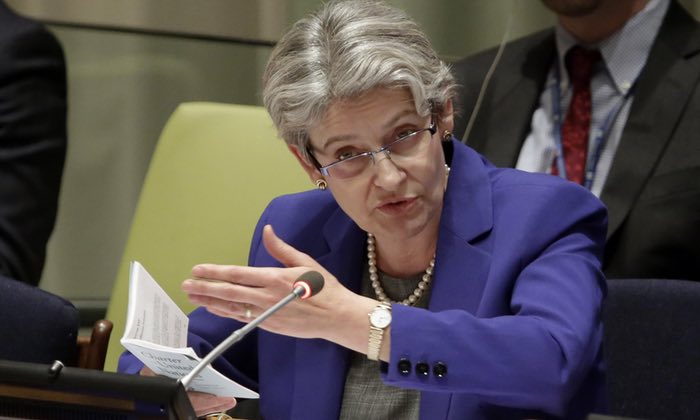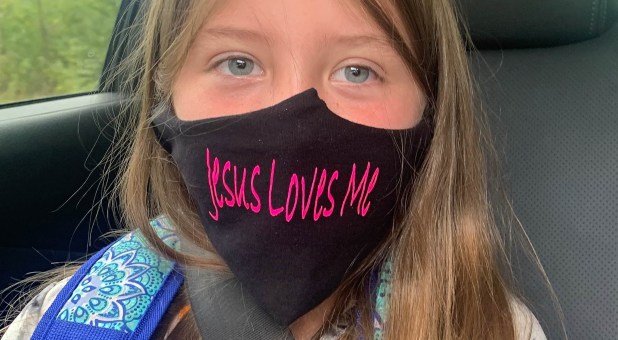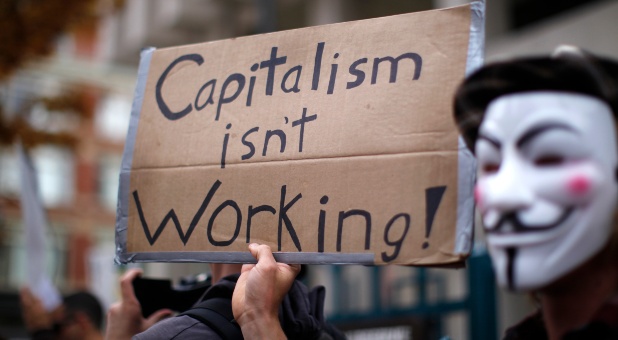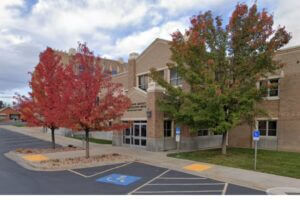The United Nations Educational, Scientific and Cultural Organization—UNESCO—has a notorious reputation for anti-Semitic bashing of Israel and for attempting to whitewash Jews from the history of Jerusalem.
So, recent comments from the agency’s director-general to the European Parliament were certainly head turning. Irina Bokova, once considered a front-runner to be U.N. Secretary-General during the most recent selection process, firmly stated the Judeo-Christian connections to the Holy City and even declared history supported that assessment.
No doubt the representatives of Muslim-majority countries who heard her comments were less than thrilled. Here’s what she had to say:
In turbulent times, when we far too often see the impact of division, mistrust and hatred, we must focus on places and initiatives that bring us together. In these times of passionate debates about “fake news”, “post truth” and disinformation, we must recall the weight of history and knowledge. I believe this is the promise of Jerusalem.
The heritage of Jerusalem is indivisible.
Nowhere in the world more than in Jerusalem do Jewish, Christian and Muslim traditions share space and interweave to the point that they support each other. These cultural and spiritual traditions build on texts and references, known by all, that are an intrinsic part of the identities and history of peoples.
In the Torah, Jerusalem is the capital of King David, where Solomon built the Temple and placed the Ark of the Covenant. In the Bible, Jerusalem is the city of the passion and resurrection of Jesus Christ. In the Quran, Jerusalem is the third holiest site in Islam, where Muhammad arrived after his night journey from Al Haram Mosq (Mecca) to Al Aqsa.
In this microcosm of humanity’s spiritual diversity, different peoples worship the same places, sometimes under different names.
The recognition, use of and respect for these names is paramount. The Al Aqsa Mosque/Al-Haram al-Sharif, the sacred shrine of Muslims, is also the Har HaBayit—or Temple Mount—the holiest place in Judaism, whose Western Wall is revered by millions across the world, a few steps away from the Saint Sepulchre and the Mount of Olives holy to the Christians.
I sometimes think of an image of the great Temple of Angkor, in Cambodia, where the monuments and the forests are so intertwined that if one would try to separate them, everything would collapse.
Jerusalem puts us in front of a radical choice.
We can try to ignore these interactions, distort our heritage in endless disputes about what belongs to whom, to this culture or another, and cut our heritage in pieces. Or we can make another choice and decide to unite for heritage, to harness the power of heritage to build peace, and better understand our common destiny.
The outstanding universal value of the City of Jerusalem, and the reason why it was inscribed on the UNESCO World Heritage list, lies in this synthesis, which is an appeal for dialogue, not confrontation. To deny, conceal or erase any of the Jewish, Christian or Muslim traditions undermines the integrity of the site and runs counter to the reasons that justified its inscription on the UNESCO World Heritage list.
We have a collective responsibility to strengthen this cultural and religious coexistence, and this is my absolute daily determination as director-general, to work with all member states in this spirit. It is not always easy, but there is no other way.
Ladies and gentlemen, the protection and better understanding of the heritage of Jerusalem is part of a broader vision for peace. It is part of a wider vision to fight against all forms of denial of Jewish history, delegitimization of Israel, and anti-Semitism.
This work is essential, as Europeans know too well the ravages of war and anti-Semitism. The Nazis were defeated, but anti-Semitism is still alive. We see it rising again in Europe, even here in Brussels, where the Jewish Museum has been targeted—and how many hateful messages are shared every day on social networks, in schools, how many synagogues are vandalized?
Anti-Semitism wears many masks: religious, political, social, racial. Today, anti-Semitism exists also—it is important to say it— in the form of a hateful and systematic criticism of Israel and the will to delegitimize its existence. Our response must be strong, on all fronts.
Against those who distort history, UNESCO’s role is also to tell the truth about Jewish history, to protect World Heritage sites in Israel, to share the wealth of Jewish culture among all other cultures:
-
- as we did with B’Nai Brith, during our symposium on the Permanence of Yiddish in 2012
- as we did with the Simon Wiesenthal Center in 2015, with our exhibition on 3,500 years of relations between the Jewish people and the Holy Land, which has travelled around the world, to the Knesset, the U.S. Congress, the Vatican, Buenos Aires and Baku.
Against Holocaust denial, which fuels anti-Semitism today, we must teach about the Holocaust, and UNESCO is the sole U.N. Organization that has educational programs on the lessons of the Holocaust, training teachers and crafting pedagogical materials, with the aim of combating modern anti-Semitism today. Over the last eight years, UNESCO has organized countless workshops, conferences on this issue, to educate, to raise awareness, to mobilize, and we are about to publish, in cooperation with the United States Holocaust Memorial Museum, a guide to policymakers, curriculum developers and educators.
Against the new forms of anti-Semitism, we must constantly reinvent our tools. We work with the International Holocaust Remembrance Alliance, with which we organized a conference in December on the prevention of anti-Semitism through education, culture and communication, in the presence of Robert Badinter. With the Organization for Security and Cooperation in Europe, we will produce this year new tools for educators, as we have done to denounce anti-Muslim racism in schools.
For all this, we need the mobilization of all member states, to really make a difference, and this is why I believe our cooperation with Israel, on these issues as well as on scientific research, new technologies, and so much more, is so vital. We have built a strong network of partners in Israel, with the Golda Meir Institute, with the Weizmann Institute of Science, among others, and this needs to grow further. This work is part of a broader commitment against violent extremism and hatred.
I was here in Brussels, at the European Parliament, a few days ago, on March 21, to open the Event on Education for Preventing Violent Extremism, with the Honorable Mr. Pavel Telicka, vice president of the European Parliament.
We shared a clear understanding that “hard power” is not enough to counter a threat that draws on an exclusive vision of the world, that builds on false interpretations of faith.
We need the “soft power” of education, culture and communication also, to win the battle of ideas. This is a both a humanist endeavor and a security imperative. I see this as the renewed importance and relevance of UNESCO today.
This is the spirit of our unique cooperation with the European Union, to bolster education in emergency situations, in refugee camps in Turkey, Lebanon and Iraq, to protect cultural heritage in the Middle East, to rebuild the Mausoleums in Timbuktu.
This goal underpins UNESCO’s work to craft education guidelines for human rights education—there are the 2006 Guidelines on Intercultural Education and the 2011 Guidelines for Educators on Countering Intolerance and Discrimination against Muslims, led with the Council of Europe and the OSCE. This goal underpins UNESCO’s leadership in the first high-level Conference on Education to Prevent and Counter Violent Extremism, organized at UNESCO in 2015, with the support of the United States.
This guides the normative tools developed by UNESCO—our Teachers’ Guide on the Prevention of Violent Extremism and our forthcoming Guide for Policy-Makers on the Prevention of Violent Extremism through Education.
We are acting also in the digital world, with the first International Conference on Youth and the Internet—Fighting Radicalization—we held a second International Conference on Countering Youth Radicalization in Cyberspace last November in Quebec, Canada.
To succeed, we need to share history, we need to show everybody that dialogue among cultures actually exists and has always existed—that it is not only a dream, but very much a reality, embedded in the stones and landscapes of our World Heritage, around the World.
And this is why we must build on the message carried by universal cities, like Jerusalem, that have brought together so many different people, in the past, and that can certainly do so again in the future.
Jerusalem is a symbol of this commitment, and I thank you very much for letting me share it with you today. {eoa}
See an error in this article?
To contact us or to submit an article





















